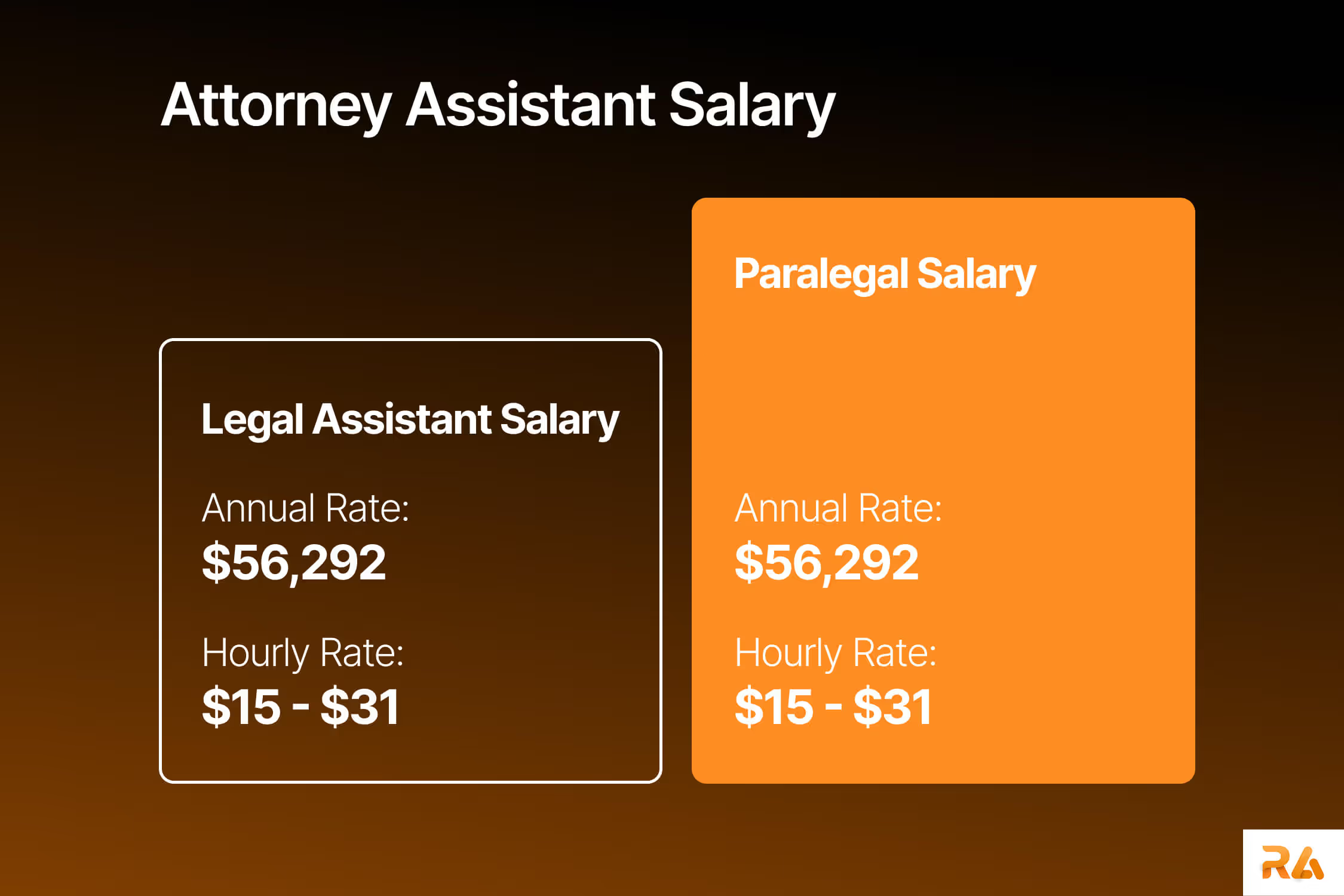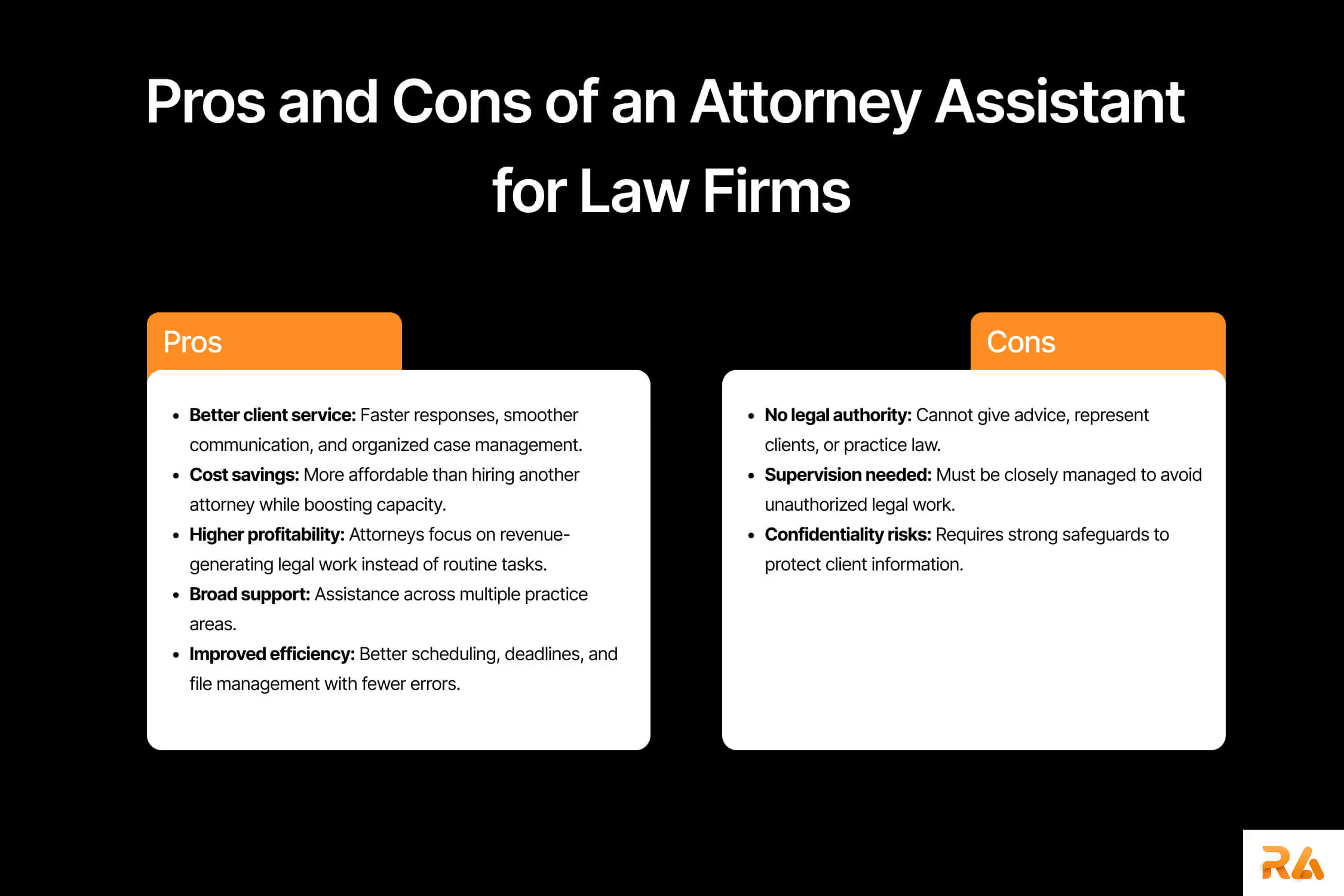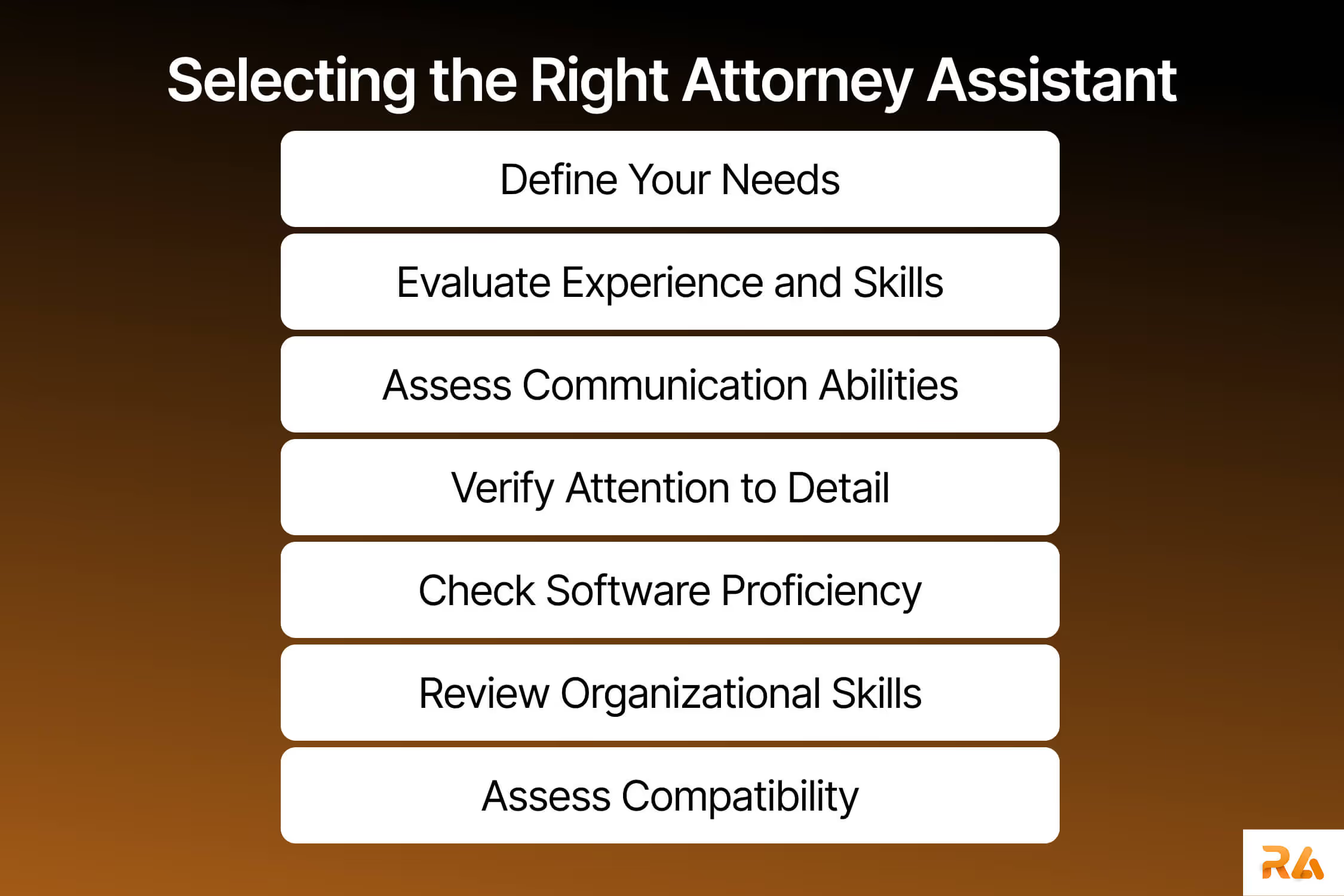The simple terms we think we understand don’t always reveal their true meaning. The term "attorney assistant" is a good example of this, as it is used in the legal profession with different interpretations. While it may sound self-explanatory, many professionals still misuse it, which can lead to misunderstandings.
To clarify, the terms "legal assistant" and "paralegal" are often used interchangeably with attorney assistant, but they refer to distinct roles. It's because the title "attorney assistant" is a broad term that can apply to either of the two roles. This guide will help you understand the role of an attorney assistant in legal practice by covering essential information and providing guidance on how to find the right one for your needs.
What is an Attorney Assistant?
An attorney assistant is a legal support professional who provides administrative and legal assistance to lawyers and law firms. They handle a wide range of tasks that help legal practices operate efficiently under the supervision of a licensed lawyer. This title is often used interchangeably with legal assistant or paralegal, though responsibilities may vary by employer.
Attorney assistants are found in a wide variety of legal settings, including private law firms, corporate legal departments, and government agencies. Their role is essential to the effective management of legal cases and day-to-day office operations.
What Does an Attorney Assistant Do?
Based on the definition we've covered, an attorney assistant's diverse skillset is essential for supporting law firms and attorneys. They handle administrative and legal support tasks that help keep a practice running efficiently.
Many attorneys face challenges in keeping their practice profitable and efficient, with lawyers spending only 2.9 hours of each workday on billable work and the rest on non-billable tasks like administrative work. This highlights the value of having the help of an attorney assistant.
The exact duties of an attorney assistant can vary depending on the firm, jurisdiction, and the professional’s experience and education. Here are the typical tasks an attorney assistant handles:
- Case Management – Organizing and maintaining case files, client information, and legal documents.
- Legal Research – Researching legal precedents, statutes, and relevant materials to support cases.
- Client Communications – Managing calls, greeting clients, taking messages, and scheduling meetings.
- Document Preparation – Drafting and formatting legal documents, correspondence, and exhibits under attorney supervision.
- Administrative Support – Managing calendars, handling mail, booking travel, ordering supplies, and coordinating office operations.
- Billing Assistance – Tracking billable hours, preparing invoices, and managing client accounts.
- Court Support – Filing court documents, scheduling hearings, preparing materials, and tracking deadlines.
- Trial Preparation – Organizing exhibits, compiling trial notebooks, and coordinating witnesses.
- Technology Management – Using legal software, maintaining databases, and managing electronic files.
- Office Coordination – Managing reception duties, coordinating with vendors, and supporting overall office workflow.
While they perform a wide range of legal tasks, attorney assistants cannot provide legal advice or represent clients in court, as these duties are reserved for licensed attorneys.
Attorney Assistant vs. Assistant Attorney
An attorney assistant is an administrative and legal support professional who is not a licensed lawyer, so they cannot perform tasks that constitute the practice of law.
An assistant attorney is a licensed lawyer in a junior role within a law firm, government agency, or legal department, qualified to perform all activities that constitute the practice of law.
Do You Need a Degree to Become an Attorney Assistant?
No, you do not need a bachelor’s degree to become an attorney assistant. A high school diploma or GED is typically the minimum educational requirement. However, many employers prefer candidates with additional experience or credentials that set them apart in the competitive job market. As a result, many pursue post-secondary education such as a paralegal certificate, legal assistant certificate, or an associate's degree. These qualifications can lead to better job opportunities, higher starting salaries, and greater potential for advancement.
How Do I Know If I Need One?
Deciding whether to hire an attorney assistant often comes down to efficiency and client service. Consider bringing one on when you experience situations like:
- You’re spending more time on paperwork than on practicing law.
- Your client base is expanding beyond what you can personally manage.
- Deadlines are becoming difficult to track, putting you at risk of missing filing dates or court appearances.
- You need to maximize billable hours, but administrative duties are consuming them.
- Clients are experiencing delays in communication or case updates.
- You need support with legal research or document drafting.
- You’re turning away potential clients due to a lack of support to handle additional workload.

How Much Does an Attorney Assistant Cost?

The cost of hiring an attorney assistant varies depending on the specific role. Since the term "attorney assistant" is a general title that can refer to either a paralegal or a legal assistant, the salary will depend on which position you are hiring for.
According to Indeed data, paralegals earn an average annual salary of $64,825 in the United States, while legal assistants earn an average of $56,292 per year. ‘
On an hourly basis, paralegals typically earn between $23 to $55 per hour, compared to legal assistants who range from $15 to $31 per hour. These figures show that paralegals generally receive higher compensation than legal assistants, reflecting their more substantive legal work that often requires specialized legal training and expanded responsibilities.
Advantages and Disadvantages of an Attorney Assistant

Before deciding to hire an attorney assistant, it’s helpful to weigh the benefits and limitations. Here’s a clear breakdown:
Advantages:
- Enhanced client service. A support staff can provide faster response times, better communication, and more organized case management.
- Cost-effectiveness. Hiring an attorney assistant is often more affordable than adding another licensed attorney, while still expanding your firm's capacity.
- Increased profitability. By handling administrative and routine tasks, they free up attorneys to focus on higher-value legal work that generates more revenue.
- Wide legal support. They can back legal professionals with tasks across cases in a wide range of practice areas.
- Improved efficiency: With an assistant managing schedules, deadlines, and file organization, a legal practice can operate more effectively and reduce the risk of administrative errors that could impact cases.
Disadvantages
- Limited legal authority. They cannot provide legal advice, represent clients in court, or perform tasks that constitute the practice of law.
- Supervision requirements. Core legal duties cannot be delegated to them, and they must not engage in the unauthorized practice of law.
- Confidentiality Risks. As with any employee, there is a risk of breaching confidentiality, so firms must have strict protocols to protect sensitive client information.
How to Hire an Attorney Assistant
Now that you understand the duties and responsibilities of an attorney assistant, you can see the important role they play in a legal practice and in keeping business operations running smoothly. But what’s the next step in finding the right assistant to match your needs?
If you’re ready to start your search, you generally have three options:
- Direct recruiting and hiring: Post job listings, conduct interviews, and manage the entire hiring process yourself. This method gives you complete control but can be time-consuming and resource-intensive.
- Using a recruitment specialist: Work with a professional recruitment agency that handles candidate sourcing, initial screening, and presents qualified candidates for your consideration. This saves time and effort but typically comes with a fee, often a percentage of the new assistant’s salary.
- Choosing from a pre-Vetted talent pool: Platforms like Remote Attorneys let you browse profiles of candidates who have already been screened and hire them directly. This is a popular choice for firms seeking remote or contract-based assistants quickly.
Tips for Selecting the Right Attorney Assistant

You have several options for finding an attorney assistant, but the next step is choosing the right one to complement your practice needs. Here are some key tips to guide your selection process:
- Define your Needs: Identify the specific tasks for which you require assistance. Determine the goals and workload to help you find an assistant with the necessary experience and expertise.
- Evaluate experience and skills: Look for candidates with experience in your specific practice areas. A strong candidate will have a solid understanding of legal procedures and terminology.
- Assess communication abilities: Choose someone with strong written and verbal communication skills, as they will directly interact with clients, opposing counsel, courts, and other legal professionals on your behalf.
- Verify attention to detail: Legal work demands precision. Test candidates’ ability to spot errors, follow complex instructions, and maintain accuracy under pressure.
- Check software proficiency: Ensure your candidate is proficient with legal software, case management systems, and any other tools you use, so they can integrate into your workflow without causing delays.
- Review organizational skills: Your assistant should be capable of managing multiple cases, tracking deadlines, and prioritizing tasks effectively in a fast-paced environment..
- Assess compatibility: Select someone whose work approach, communication style, and professional values align with your firm's culture and your personal working preferences. Trust your instincts and prioritize your comfort and confidence with their abilities to support you, as this working relationship is essential.
Can an Attorney Assistant Work Remotely?
Assisting attorneys is now being performed remotely in many law firms. As technology and AI continue to develop exponentially, many modern tools are emerging to assist with a lot of work, including legal practice. This has opened doors and broken down the barriers of hiring constraints due to location. With remote work, you can find attorney assistants across the world; you just need the right tools and setup to perform tasks effectively.

Final Thoughts on Attorney Assistants
In conclusion, an attorney assistant is a valuable resource that offers wide-ranging support to legal professionals. By taking on administrative and routine tasks, they allow lawyers to deliver better client service and run their practices more efficiently.
While the initial investment in hiring an attorney assistant requires careful consideration, the short-term and long-term benefits of increased billable hours, freed-up time to focus on legal work, and improved client services typically far outweigh the costs. Take the time to clearly define your needs and evaluate your requirements when choosing your assistant, as they can become an invaluable partner in your firm's growth.
If finding the right assistant feels daunting, Remote Attorneys provides instant access to a talent pool of rigorously trained and pre-vetted attorney assistants. Our candidates meet the highest professional standards and can save you up to 80% compared to hiring in-house. Click here to get started.


.webp)

.webp)